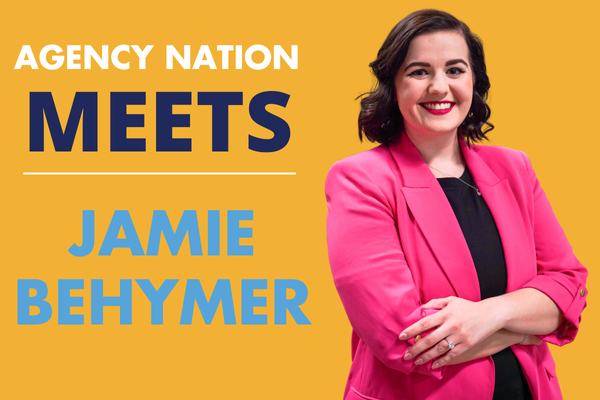The Right Start: Mentors Show Rookies the Way

By: Jacquelyn Connelly
Plans for construction of a brand-new addition finally began in fall 2017—and stopped short when contractors discovered that the entire foundation of the building was in shambles.
“Termites, mold issues—it was in really, really bad shape,” says Ochoa, operating manager. “We ended up having to demolish the whole office.”
Ochoa had initially planned for a one-week closure due to lack of electricity during construction of the addition. That quickly morphed into over two months of remote work for Ochoa and her four employees.
But thanks to a huge technology push over the last year that included going paperless, adopting e-signature and utilizing the agency’s management system to its full potential, “everybody’s been operating great,” Ochoa says. “Our sales are still going strong. We haven’t lost any business.”
Ochoa had long been considering making some serious tech changes at the agency she bought from Lamon Warnock, her friend and former boss from her days as an Allstate agent, in 2014. But she was never sure where to start.
The inspiration for taking the plunge came from her participation in the Big “I” Right Start Training Series Mentorship Program—a pilot project the association launched in fall 2017 that pairs new independent agency owners like Ochoa with veteran agents and company representatives [see sidebar] to share insights and guidance about how to thrive as a new business.
Paired with Daniel Mercure, Jr., owner of Mercure Insurance Agency, Inc. in Rockwood, Michigan, Ochoa was one of five mentees who participated in the program. “I told Dan, ‘Thanks to you and thanks to this program, I’m not out of business,” she says.
What It Covers
Deb Shenberger, owner and executive officer of Shenberger Insurance Services Agency, Inc. in Frenchtown, New Jersey, got involved with the program as a mentor to Rubymir Romero, three-year owner of Salem Enterprise in Riverdale, Maryland.
“It’s a great way to give back to our industry,” Shenberger says. “Sharing one’s experience can help newer folks in our industry focus on what they need to do to be successful and shed light on some of the misconceptions they may have about what agency ownership is all about.”
How? By fostering discussion between mentees and mentors regarding four key categories of business success:
Agency operating style. For Ochoa, this part of the program focused heavily on tech changes. Her former low-tech approach to agency operations was the legacy she inherited from the agency’s previous owner.
“He was still using paper files, and although he had a management system, he was only using it for quoting—not to store any information,” Ochoa recalls. “I came in and trained with him for six months before I purchased the agency, and that’s how they were doing it. I just got used to whatever they were doing.”
But Mercure, the fifth-generation owner of a family agency that started in 1890, had recently spearheaded his own agency’s transition to paperless—and he recognized a few familiar struggles in his conversations with Ochoa.
“One of the downsides of being around for so long is you get into the habit of, ‘This is how we’ve always done it.’ But that’s when you start realizing, if we keep doing it this way, everybody’s going to pass us by—and then we’ll be a really old, small agency that’s not going anywhere,” Mercure points out. “Janeth was having some issues with efficiency, and I was able to recognize those growing pains.”
“Agency operating style” is a broad topic, and participants interpreted it in a variety of ways to best suit their needs. Ronald Brunell, third-generation principal at The Signature B&B Companies in Garden City, New York, served as mentor to Mel Evans, who started his Knoxville, Tennessee-based agency InsureFit RM at the end of 2012 when former employer Sentry Insurance went through a major downsizing.
During the first module, Brunell says, the majority of the pair’s conversation revolved around the idea that “if you sell an account on price, you’re going to lose an account on price.”
“Once a shopper, always a shopper,” Brunell says. “I told Mel, ‘You want to strive to set yourself up as the trusted adviser. If you sell an account on your knowledge of the client and you tailor a program to that client, you’re always going to wind up having the last look.’”
Employee productivity. As a new agency owner who’s focused on keeping the trains running day to day, “you may not even realize how much more you can enjoy the business when it’s not such a grind,” Mercure says. “When you’re having time to enjoy things, the staff is happier because it’s not so mundane.”
Ochoa, who spent over a decade as an Allstate agent before purchasing her agency, says the program changed her approach to management 180 degrees. “For three years, I was going in every morning and helping my employees with regular sales and issues—sell a policy, file a claim, whatever it was,” she says. “As a manager, I had no idea what to do.”
Now, “I have a really good idea now of how an independent agency works and what I need to be doing to manage my agency, instead of just working like a regular employee,” she says.
Evans says this part of the program was particularly helpful in focusing his attention on hiring and employee incentives after a lead producer turned in his notice. “When you only have four employees, losing someone has a big impact,” he says. “I’m trying to be forward-thinking. How can I enhance what we do right now, how can I improve it, and how can I put together a solid package for whoever we bring on board next?”
Kori Sagen, owner of Sagen Insurance in Broadhead, Wisconsin, agrees that her mentors helped point her in the right direction about staffing issues. Paired with Jim Armitage, senior principal at Arroyo Insurance in Arcadia, California, and Richard Schumacher, associate vice president of sales, Nationwide, Sagen sought advice on whether she should expand her staff from two employees who sometimes felt more like family than co-workers.
“We’ve always gotten along great, with such a fantastic culture and comradery that I never really had rules,” says Sagen, who started her agency on the heels of the recession after building an insurance career that included roles ranging from receptionist to marketing rep to operations manager.
But the more Sagen spoke with Armitage and Schumacher, the more she realized that a defined staffing structure would be a crucial foundation for future growth. “They pointed out, ‘Not everybody’s going to be as great as these two you have working here that just fit like a glove,’” she says. “I ended up writing an employee handbook and hiring two new staff members. So far, they seem to meld into our group very well.”
“It’s not as scary to make a big decision like that when you have somebody with some background who’s been there, done that, giving you some support,” Sagen adds. “That gave me more confidence in my decision.”
Company appointments. “We talked about, ‘How do you make the company want to do business with you?’ Instead of being the same agency as everybody else—‘I want the appointment because you’re in the hot market’—you have to pitch them on what makes you a differentiator,” Brunell explains. “You want them chasing you, as opposed to you chasing them.”
Tim Breadon started The Breadon Group, LLC in Rockford, Michigan two years ago after spending 10 years on the MGA side. Paired up with mentors Cindy Webster, president & CEO of Jack Rice Insurance in Largo, Florida, and Jeff Ogard, vice president of agency relations at Safeco, Breadon was able to secure a commercial appointment with Safeco through his relationship with Ogard.
“Before the program was even over, I had gone through the appointment process and secured the deal,” Breadon says. “Might have we gotten that appointment without the program? Sure, but it probably would have been harder.”
Goal setting. Brunell says he and Evans spent a lot of time talking about the difference between saying, “I want to grow my agency 5% or $500,000,” and understanding the steps necessary to get there.
“Let’s look at our average account size and our hit ratio, and let’s break it down—if we want to write $500,000 in a year, that’s $45,000 a month and $11,000 a week,” Brunell says. “How many accounts do we have to close to hit that goal? And how do we get everybody in the agency looking at those more manageable metrics, as opposed to looking at a really big number? Let’s measure that on a weekly and a monthly basis so we know we’ve hit our stride.”
Why It Works
Each module followed a four-week schedule, with a webinar the first week followed by workbook projects and a self-evaluation the second, and a 30-minute phone call at some point in the last half of the month.
Although many of the participants admit they didn’t meet every deadline and sometimes went a little off-script, everyone agrees the formal structure served as a helpful guardrail. “The questions in some of the workbooks led to other helpful discussions, and the deadlines helped keep our feet to the fire,” Webster says.
But for Sagen, the benefits of the program’s formal structure went deeper than deadlines. The day the Big “I” reached out to introduce her to her mentors, her father was killed by a drunk driver.
“My Big ‘I’ contact told me, ‘You don’t have to do this—we can schedule you for a later one.’ But I just felt that having that accountability at that particular time was going be helpful for me,” recalls Sagen, who notes that she couldn’t have asked for more compassionate, helpful mentors than Armitage and Schumacher. “I said, ‘Just give me a week to figure out which way’s up again, and then I want to keep moving forward.’”
The assignments and deadlines that were built into the program “kept me engaged and re-motivated me,” Sagen says. “It would have been so easy to fall into that headspace of, ‘I don’t want to put in any effort right now.’ Maybe it sounds dramatic, but just having positive feedback from my mentors was my life raft.”
Jacquelyn Connelly is IA senior editor.
Interested in getting involved with a future iteration of the Right Start Training Series Mentorship Program? Contact Whitnee Dillard, Big “I” Diversity programs director.
In the meantime, stay in the loop about industry diversity programs and events by subscribing to the Big “I” Diversity distribution list.
Support SystemA special thank you to the Big “I” Diversity Task Force and all the company mentors that participated in the first wave of the Right Start Training Series Mentorship Program, including:
|










